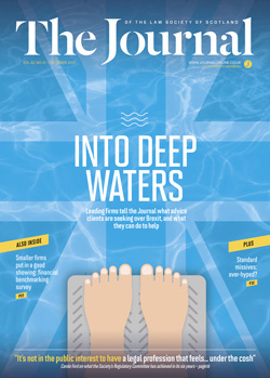Board policy: do not shake

In many parts of Scotland, the May council elections saw an unusually large turnover of councillors. This is reflected in the composition of licensing boards, with many new members just finding their feet. I know of one board where only two of its 10 members have ever served on a board before. It will be interesting to see whether this has any significant impact on board policies, which will be at preparation stage.
Such a policy is required in terms of s 7 of the 2005 Act. As originally enacted it was to cover a three year period. It is now required to cover a licensing policy period, that is to say the period between a date occurring 18 months after the last council elections and a date 18 months after the next ones. The amount of work in preparing such a policy is huge. A board is entitled to seek statistics from the police, the health board and its own council, plus any other party it sees fit. (Whether the average licensing board has among its officials people capable of the highly specialised business of interpreting statistics is another question.)
Across the country, local authorities are having to cope with fewer personnel. While certain core licensing board roles are ringfenced, experience suggests that with smaller numbers of support staff, things are even more stretched than before. In spite of this, clerks now have to deal with the new ss 9A and 9B, the requirements to prepare an annual functions report and an annual financial report. Many must be hoping that new brooms are in no hurry to sweep clean by tearing up polices and starting again.
Overprovision: a difficult line
It is a requirement of the Act that each board policy must include an overprovision policy. My guess is that this too may well be causing sleepless nights. After the mauling which Dundee Licensing Board, and in particular its overprovision consultation process, received in the recent Aldi appeal, I wonder how many clerks are satisfied that they got it right in their own policy. If the drawing board is to be revisited here, it is yet another significant burden. That part of the job will always be a tricky one, not least because of the ever vocal health lobby who will claim that every new licence and every extension of licensed premises increases Scotland’s problem with alcohol.
I suspect that Alcohol Focus Scotland and I will never see eye to eye on this. I find it difficult to rationalise their claim that they have definitive proof (once described by a senior trade figure as “voodoo science”) with their eagerness to back even more pieces of research. If you have the proof, why cover the ground again? When licensing board hearings descend into amateur debates about statistics concerning Scotland’s most deprived areas, which may or may not coincide with licensing board areas, I suspect a professional statistician would sneer. What will be very interesting will be the impact of minimum unit pricing, which I believe will be with us before long and to which I will extend a cautious welcome.
No shame in sitting tight
It is my hope that we don’t see a whole raft of new policies. While things ought not to stand still, changes wrought by the inexperienced can create more problems than they solve. We still await the implementation of some parts of the 2015 Act, in particular its flawed transfer provisions. There will be many issues to be dealt with simply keeping up to date with change.
To any clerk who fears being criticised for keeping things much the same as before, I offer this consolation. The Scottish Government issued its statutory guidance in 2007. Not one word of that has been amended, despite myriad pieces of legislation since. The civil servants are still in a job, and probably still without shame.
In this issue
- Form that misses the mark
- The dual role: before and after
- Don't just write – plan
- CMS enforcement: little help when needed?
- Flight or fight
- Reading for pleasure
- Opinion: Campbell Deane
- Book reviews
- Profile
- President's column
- Knowledge base becomes smarter
- People on the move
- Brexit: planning for "What if?"
- Report card
- Greater good and greatest need
- Finances: big not always better
- Doulas: living and dying well in Scotland
- Lobbying: the new regime
- Protect yourselves, Society warns
- Ending short sentences: impact on the courts
- Board policy: do not shake
- Brexit and professional sport
- Rely on HMRC's guidance at your peril
- Standard missives: an unachievable dream?
- Let in-house keep you right
- Accredited specialists: five years can qualify
- What's Daisy done?: Society's new campaign
- Law reform roundup
- Wartime honour
- Paralegal pointers
- Society sets up secure channel
- All fee earners now
- Stand up to your stammer
- The data imperative
- Ask Ash
- In-house: my client, my job?
- Q&A corner
- Giving cheques a new image






